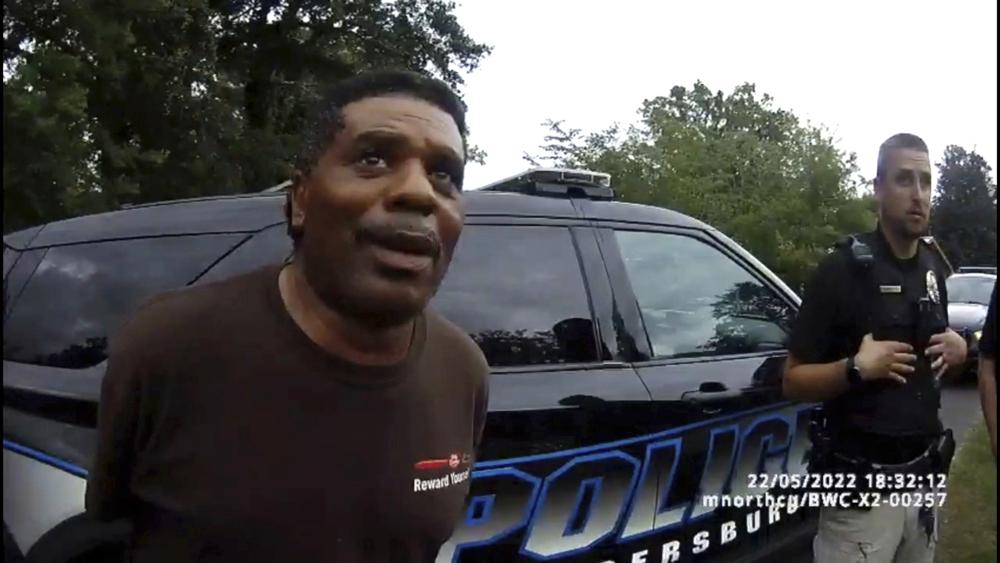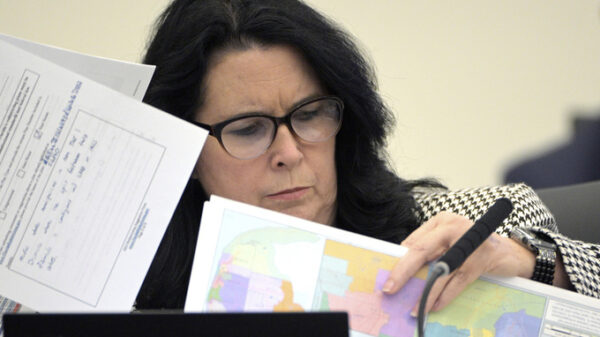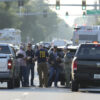This image captured from bodycam video released by the Childersburg (Ala.) Police Department and provided by attorney Harry Daniels shows Michael Jennings, left, in custody in Childersburg, Ala., on Sunday, May 22, 2022. Jennings was helping out a friend by watering flowers when officers showed up and placed him under arrest within moments. (Childersburg Police Department via AP)
CHILDERSBURG, Ala. (AP) — Michael Jennings wasn’t breaking any laws or doing anything that was obviously suspicious; the Black minister was simply watering the flowers of a neighbor who was out of town.
Yet there was a problem: Around the corner, Amber Roberson, who is white, thought she was helping that same neighbor when she saw a vehicle she didn’t recognize at the house and called police.
Within minutes, Jennings was in handcuffs, Roberson was apologizing for calling 911 and three officers were talking among themselves about how everything might have been different.
Harry Daniels, an attorney representing Jennings, said he plans to submit a claim to the city of Childersburg seeking damages and then file a lawsuit. “This should be a learned lesson and a training tool for law enforcement about what not to do,” he said.
A 20-minute video of the episode recorded on one of the officers’ body cameras shows how quickly an uneventful evening on a quiet residential street devolved into yet another potentially explosive situation involving a Black man and white law enforcement authorities.
“Whatcha doing here, man?” Officer Chris Smith asked as he walked up to Jennings, who held a hose with a stream of water falling on plants beside the driveway outside a small, white house.
“Watering flowers,” Jennings replied from a few feet away. Lawn decorations stood around a mailbox; fresh mulch covered the beds. It was more than an hour before sunset on a Sunday in late May, the kind of spring evening when people often are out tending plants.
But moments before, a woman had dialed 911 about a “younger Black male” and gold SUV that she saw at the house even though the owners were away, according to a call transcript obtained by The Associated Press.
Walking toward Jennings, Smith told him that a caller said she saw a strange vehicle and a person who “wasn’t supposed to be here” at the house.
Jennings told him the SUV he was talking about belonged to the neighbor who lives there.
“I’m supposed to be here,” he added. “I’m Pastor Jennings. I live across the street.”
“You’re Pastor Jennings?”
“Yes. I’m looking out for their house while they’re gone, watering their flowers,” said Jennings, still spraying water.
“OK, well, that’s cool. Do you have, like, ID?” Smith asked.
“Oh, no. Man, I’m not going to give you ID,” Jennings said, turning away.
“Why not?” Smith asked.
“I ain’t did nothing wrong,” the pastor replied.
Jennings, 56, was born in rural Alabama just three years after George C. Wallace pledged “segregation forever” at the first of his four inaugurations as governor. His parents grew up during a time when racial segregation was the law and Black people were expected to act with deference to white people in the South.
“I know the backdrop,” Jennings said in an interview with AP.
Meanwhile, the officers who confronted him on May 22 work for a majority-white town of about 4,700 people that’s located 55 miles (88 kilometers) southeast of Birmingham down U.S. 280. White people control city hall and the police department.
Jennings went into the ministry not long after graduating from high school and hasn’t strayed far from his birthplace of nearby Sylacauga, where he leads Vision of Abundant Life Ministries, a small, nondenominational church, when not doing landscaping work or selling items online. In 1991, he said, he worked security and then trained to be a police officer in a nearby town but left before taking the job full time.
“That’s how I knew the law,” he said.
As Jennings and Smith argued over whether the pastor needed to show an ID, another officer walked into view.
His voice rising, Jennings asked who called the police.
“You see a Black man out here watering his neighbor’s flowers and you think it’s something illegal,” Jennings said loudly.
“I’m not saying nothing about …,” Smith responded.
“You have no right to approach me if I ain’t did nothing suspicious or nothing wrong,” Jennings said, gesturing with his right hand and continuing to hold the garden hose with his left. With the officers also talking, he added: “You want to lock me up? Lock me up. I’m not showing y’all anything. I’m going to continue watering these flowers.”
About 35 seconds later, after warning that Jennings could be charged with obstruction for walking away, officer No. 2, identified in a police report as J. Gable, put the preacher in handcuffs.
“I like this,” Jennings told them. He added: “It’s already a lawsuit.”
___
Alabama law allows police to ask for the name of someone in a public place when there’s reasonable suspicion the person has committed or is about to commit a crime. But that doesn’t mean a man innocently watering flowers at a neighbor’s home must provide identification when asked by an officer, according to Hank Sherrod, a civil rights lawyer who reviewed the full police video at the request of the AP.
“This is an area of the law that is pretty clear,” said Sherrod, who has handled similar cases in north Alabama, where he practices.
Giving police the same name he routinely uses as the minister of a Black church, where ecclesiastical titles are important, Jennings identified himself, without any prompting, as “Pastor Jennings” within seconds of Smith’s approach. That might have been adequate for someone steeped in the culture of Black Christianity, but it wasn’t for white police officers.
Source: https://apnews.com/article/alabama-arrests-race-and-ethnicity-e8638d2a3c479526abee0acb894356d8






























You must be logged in to post a comment Login